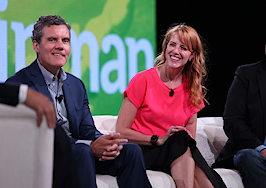Join industry visionaries Pete Flint, Spencer Rascoff, Ryan Serhant and more at Inman Connect New York, Jan. 24-26. Punch your ticket to the future by joining the smartest people in real estate at this must-attend event. Register here.
A new chapter in perhaps the most polarizing story in real estate began earlier this week, when Zillow unveiled a new brand that will include some of the industry’s most beloved tools — and which was intended as something of an olive branch to agents.
The brand, dubbed ShowingTime+, is the latest development in Zillow’s ongoing attempts to build a “housing super app.” As it’s name implies, the brand includes popular showing management platform ShowingTime, as well as other offerings such as dotloop and Bridge Interactive. When the company announced the move Monday, it framed ShowingTime+ as an effort to win over agents.
But in the days following the announcement, the response from industry professionals has been mixed at best.
“Just another way for them to steal our clients’ information. No thanks,” agent Jonathan Brubaker said in the comment section of Inman’s Facebook page.
To understand that reaction, you have to grasp Zillow’s sometimes fraught, sometimes fruitful history with agents. It’s a history that goes back years via things such as the Premier Agent lead generation program, and which took a sharp left turn last year when Zillow announced plans to buy ShowingTime — up until then the most popular showing management platform in the industry. Many agents were critical of the acquisition, with some voicing concerns over how Zillow might use their data.
In the year and a half since, the ongoing friction between Zillow and some agents has served as the backdrop to a number of other major industry stories; some cheered the demise of Zillow’s iBuying business, for instance, or rooted for CoStar in its beef with the portal due to ongoing concerns about Zillow’s relationship to industry professionals.
Ultimately, conversations agents had with Inman this week suggest that the launch of ShowingTime+ has not immediately put those concerns to rest. In fact, some has responded critically to the news, while others were confused. But while it’s clear that Zillow remains a polarizing force, others suggested that both the company and the agents have a potential opportunity on their hands.
Skeptical reactions
In an email and subsequent phone conversation with Inman, California-based real estate agent Alan Glasband described himself as a “pioneer, a drum beater” for the Premier Agent program for many years. But he ended up walking away from his relationship with Zillow amid the realization “that they were actually trying to take over my business.”

Alan Glasband
“[So in the ShowingTime+ announcement] when they said they thought they should have a division just for agents. [I was] like, ‘you gotta be effing kidding me,'” he said. “Like, you guys are calling me five times a week, asking me to rejoin your Premier Agent group and telling me you’ve got ZIP codes for me. If it wasn’t for agents, they would be already off the NASDAQ and they’d have been bankrupt.”
“So, yeah,” Glasband added, “I don’t like Zillow at all.”
The comment highlights again how the response to the ShowingTime+ news is colored by many years of history between Zillow and the agent community. And Glasband wasn’t alone.
“Let’s be clear, [Zillow] wants to remove agents altogether, they want control of the data to learn how to do exactly that,” real estate agent Matt Miller commented on Inman’s original story about ShowingTime+.

Sam Shaffer
Other agents were significantly more positive about Zillow as a company, but nevertheless tepid on ShowingTime+ itself. Sam Shaffer, an agent in Chicago, was among them. Shaffer told Inman he has had “a lot of success with Zillow” in the past, and continues to spend marketing money with the company. But he also acknowledged that the ShowingTime acquisition last year made agents nervous, and added that the launch of ShowingTime+ this week stirred a bit of confusion about the brand’s purpose.
“I actually reached out to my Zillow rep, just to get further clarification that there’s not going to be any type of change with the user experience now. He said ‘no,'” Shaffer explained. “That could just be what he’s telling me now, and then all of sudden, Zillow tomorrow could say something totally different.”
He ultimately concluded from these experiences that ShowingTime+ “is kind of a nothing.”
An opportunity in the making
Though the jury in the agent community is still out on ShowingTime+, some industry members did frame Zillow’s latest move as an opportunity.

Nick Solis
Among them, One80 Consulting Group Founder Nick Solis — who said he’s avoided wholeheartedly embracing or rejecting Zillow — told Inman there are upsides for agents “when data talks to each other.”
“The brokerage, the industry, the agent, the world has been clamoring for a more integrated platform where everything talks to each other,” Solis added. “They’ve moved on from the days of focusing on a single sign-on as a holy grail. The industry is clamoring for this kind of vertical integration, and the community that uses Zillow products are going to benefit from what they’re doing.”
Realtor Group leader Tim Collom made a similar point, noting that in a slowing market agents have a unique opportunity to guide tech companies’ hands — and Zillow has the opportunity to listen and improve.

Tim Collom
“Now, the opportunity I think is partnering and collaborating with some of these companies and saying, ‘What are the agents’ needs? What are the clients’ needs?’ And not, ‘How can we monetize something?’ he added. “People now are getting back to the basics, and I think technology can help us be more nimble.”
But as Zillow debuts the ShowingTime+ brand and works win over agents, there’s just one hitch: history.
More specifically, Solis said the biggest challenge moving forward with the brand is driving adoption among agents who are in some cases frustrated.
“Unfortunately, just because of the way that people feel about Zillow, it’s kind of the wrong company to deliver a vertically integrated experience,” he said. “I mean, they can do it, but just adding more products to their existing offering isn’t going to change people’s hearts and minds.”
“They have to change the way they interact with the industry,” Solis continued. “They have to change the narrative.”













